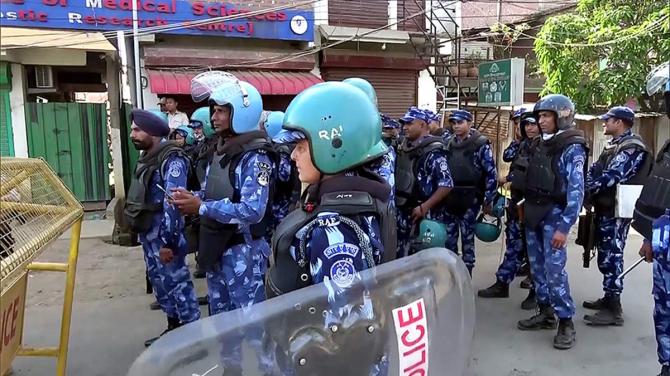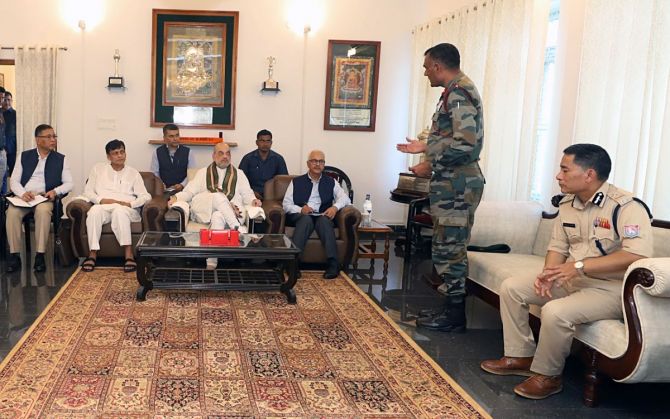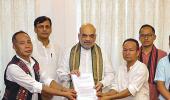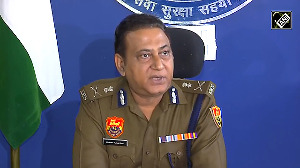'They have come here to protect people, but the allegation is that they help the armed organisations attack and burn down the houses of the Meiteis.
'Many people have lost faith in the central forces as they believe these forces are involved in the escalation of the problem.'

The violence which started on May 3 in Manipur continues almost a month later.
It took 26 days for India's home minister to visit the troubled north east state.
Professor W Nabakumar, former head of the department of anthropology, Manipur University, met Home Minister Amit A Shah on his three-day visit to Manipur.
"We appealed to the home minister to do something about the Kuki armed rebellion. The honourable home minister did not make any comment, but he assured us that the territorial integrity of Manipur would be protected," Professor Nabakumar tells Rediff.com's Shobha Warrier in the first of a two-part must-read interview.
You were invited to meet the home minister this week. What was the conversation about?
Thirteen citizens from Manipur met Home Minister Amit Shahji. He requested suggestions from us to bring the present situation to normalcy.
Of course, everybody aired their opinion.
I told him that there is a problem between the communities, but the need of the hour is to bring peace in the state.
Many of us told him that though the clash was between two communities initially -- the Meiteis and the Kukis -- now it is between Meiteis and different armed Kuki organisations who have entered the state.
These armed organisations have attacked the Meiteis, they have burnt down more than 200 houses and killed 6 people. This is what is happening in Manipur.
We appealed to the home minister to do something about the Kuki armed rebellion.
It is the responsibility of the Government of India to stop them from attacking common people because the central government forces have set up camps in the state to observe ground rules.
If they do not observe ground rules and if they continue to attack the Meitei common people, the situation will get worse. This was my observation.
The honourable home minister did not make any comment, but he assured us that the territorial integrity of Manipur would be protected, and that the Government of India also was very concerned about the lives of common people.
He also told us that more forces would be deployed to protect common people.
Who is supplying arms to these armed Kuki organisations? What was the home minister's comment on this issue?
He remained silent on this matter. He did not disclose anything. But he assured us that the territorial integrity of Manipur would be protected.
The situation is such that the majority of common people do not like the central security forces.
They have come here to protect people, but the allegation is that they help the armed organisations attack and burn down the houses of the Meiteis.
Many people have lost faith in the central forces as they believe these forces are involved in the escalation of the problem.
At the same time, Kukis are also lost their faith in the state security forces as they say majority of the (Manipur) armed forces are from the Meitei community.
The situation today is Meiteis who live in the valley have lost faith in the central forces and Kukis who live in the hills have lost faith in the state forces.
The end result is the mistrust between the two communities has widened. This is one of the major problems facing the state today.

How did the animosity between the Meiteis living in the valley and the Kukis living in the hills, start?
To understand the genesis of the problem, you have to go back to the historical process of the social formation of the different communities of Manipur.
With more than 36 ethnic groups living here, Manipur is a polyethnic society.
These 36 ethnic groups can broadly be divided into three groups -- the Meiteis, the Kukis and the Nagas.
The Meiteis, who form the majority community, inhabit the valley districts.
The other 35 communities inhabit different mountainous districts of the state.
During the colonial administrative period, the tribal people living in the hills were broadly divided into the Nagas who live in three-four districts and the Kukis who inhabit three-four districts in the hills.
Churachandpur, Kangpokpi, Tengnoupal are the three major districts where the Kukis live.

Are there more Kukis than the Nagas in the hill districts?
No, they are almost equal, but they are less than the Meiteis.
You have to also understand that the names Nagas and Kukis are just umbrella terms as they cover a number of communities.
For example, under Nagas come ten communities. Kukis also include another ten communities.
So, the population of Manipur can be broadly divided into the Meiteis, the Nagas and the Kukis.
The names, Nagas and Kukis are not given by the people, they are exogenous.
The names are given by the then British colonial administration for administrative convenience.
In fact, people do not like to be called by these names, more so the Kukis than the Nagas.
But during the Naga movement, many of the Kuki ethnic groups joined the Naga fold leaving the Kuki fold.
After Independence, many of the ethnic groups under the name Kukis disowned the name Kuki. They preferred to be identified by their own ethnic names.
So, when we analyse the social formation of Manipur, we should know that there was ethnic fusion and also ethnic fission.
But the Meiteis remained the majority community.
Kukis can be divided into two groups, old Kukis and new Kukis. This happened even during British rule.
The old Kukis are those who entered Manipur early in the historical period from the Myanmar side.
They are commonly called Chin in Myanmar, but in Manipur, they are known as Kukis.

Recently, there were protests by Kukis at Jantar Mantar in New Delhi, saying, they were Indians and not illegal immigrants...
I also fully agree with them that Kukis are very much Indians.
The old Kukis had entered Manipur as early as the 16th century, while the new Kukis entered Manipur in the late 17th century and early 18th century during the reign of Maharaja Nar Singh.
Both the old Kukis and the new Kukis are citizens of India and citizens of Manipur as they had entered the state about 200-300 years ago.
 IMAGE: Professor W Nabakumar
IMAGE: Professor W NabakumarThen, what exactly is the problem?
But after Independence, the India-Myanmar border remained porous. The result is, many Kuki people illegally entered Manipur from Myanmar.
The migration from the Myanmar side to the Indian side accelerated because of the political turmoil and instability in Myanmar.
When in Myanmar, they are Chin, and the moment they cross the border, they become Kukis.
While the people of the state are concerned about this, no legal action has been taken against the illegal immigrants.
They have settled down in the state and have become citizens of Manipur illegally.
Did it result in Meiteis feeling animosity towards these Kukis?
In the beginning, there was no animosity and people, mainly the Meiteis, were not against them.
But with illegal immigrants becoming legal citizens, the Kuki population increased in an unnatural way.
The exponential increase was more than 100%! It differs from district to district.
Then, it became a concern for the majority community, the Meiteis.
Feature Presentation: Aslam Hunani/Rediff.com











 © 2025
© 2025